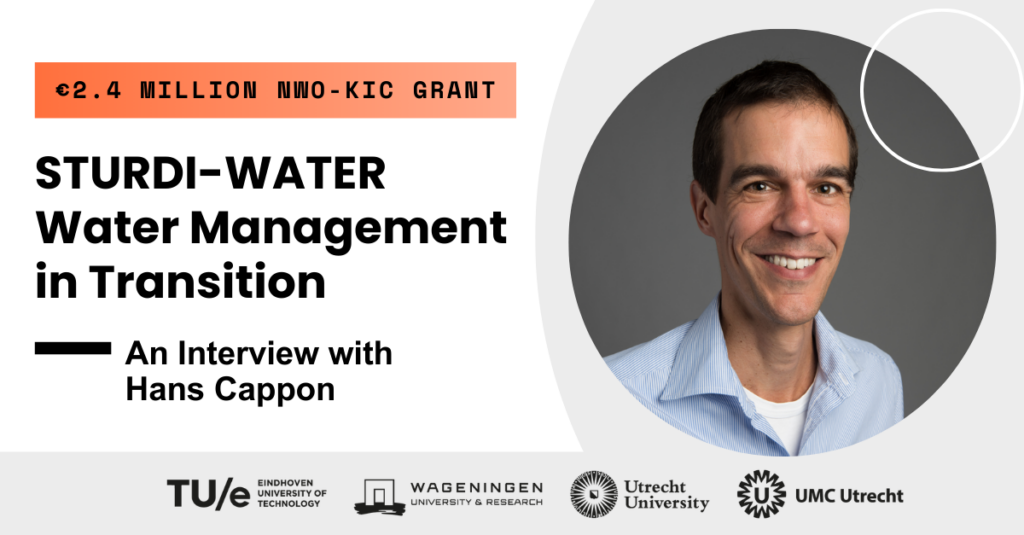In a world where the challenges of climate change are becoming increasingly urgent, water management is a crucial issue. More extreme weather and salinisation are putting pressure on the availability of freshwater in delta areas. This problem presents major challenges for agriculture, industry, nature, and tourism. The STURDI-Water consortium is pooling resources to tackle these challenges and develop a robust freshwater system. We spoke about this with Hans Cappon, professor of Water Technology at HZ University of Applied Sciences and researcher at the Environmental Technology group at Wageningen University & Research.

STURDI-Water: Towards a Robust Freshwater System
Recently, the STURDI-Water project (Storage, Upgrade, Reuse and Distribution of Water in regional collaborative networks) received a grant of €2.4 million through the NWO-KIC mission “Realisation, Acceleration, and Upscaling of Mission-Driven Innovation”. Led by Hans Cappon, a consortium of six research institutes, including Wageningen University & Research and Utrecht University, is collaborating with 21 private and public partners to develop a robust freshwater system for the delta region of Zeeland.
Cappon: “An important lesson from the past 15 years of research is that we can solve many water issues technologically. The real challenge lies in effectively applying these technologies in the right places. We face obstacles such as the absence of policy, legal frameworks, financial incentives, and effective governance cooperation. Without these elements, it will be difficult to manage the supply and demand of fresh water in a sustainable way.”
Governance and Complex Decision-Making
A crucial aspect of the project is governance. Cappon explains: “We operate in a complex field of laws and regulations. The lack of cooperation between various parties means that many water issues are addressed locally and on a small scale. Furthermore, different authorities must be approached separately for water management issues, unnecessarily slowing down the process. This is a missed opportunity; we are therefore striving for an integrated system that benefits all stakeholders.”
The STURDI-Water project proposes the creation of a ‘water bank’. Cappon explains: “A water bank could function as a central authority with the power to make decisions in the complex process of water use.”
Ethics and Priorities in Water Use
In addition to the technical and governance aspects, there is also an ethical side to water management. In the Netherlands, the ‘displacement series’ determines distribution priorities during periods of drought. Cappon explains: “The first priority is always flood protection, such as maintaining the dikes. At the bottom of the series are industry and agriculture, which often have to compete for available water. This raises ethical questions: who has more right to water, the farmer growing food or the industry?” The STURDI-Water consortium will also examine these ethical aspects to gain better insights into the impact of water distribution.
Collaboration and a Transdisciplinary Approach
Collaboration is essential for the success of the STURDI-Water project. “We work closely with the province, municipalities, water boards, businesses, and farmers,” Cappon explains. “The great thing is that everyone is aware of the importance of this cooperation. But the big challenge remains: how do we develop a system that works for everyone?”
Cappon highlights the need for a transdisciplinary approach. “We are dealing with system transformations that are large and complex. We cannot research and solve these from just one perspective. Although transdisciplinary research with so many different parties is challenging, we simply have no choice.”
A Blueprint for Sustainable Water Management
The STURDI-Water project is an ambitious initiative charting a course towards sustainable freshwater management. Cappon: “We are looking ahead to 2050 and aim to clearly map out the routes that are possible to realise our shared vision.” This is a challenging task, but one that offers great potential for the development of a national strategy. “If this project succeeds,” Cappon continues, “it will have a huge impact on Zeeland, and it could also serve as a blueprint for water management in the rest of the Netherlands.”
The future remains uncertain, but Cappon is determined. “If anything, it’s an exciting project. If we succeed, we’ll celebrate with cake. But if we fail, many areas in the Netherlands will face major setbacks – and we feel that responsibility within our consortium.”
Origins in AquaConnect, i4CS and the EWUU Alliance
The STURDI-Water project has its origins in the AquaConnect research project, supported by the i4CS, part of the EWUU alliance. The AquaConnect project focuses on creating circular water networks, an ambition that strongly influences STURDI-Water. Cappon explains: “The insights and collaborations that emerged from AquaConnect form the foundation of what we are doing now. AquaConnect helped us look at water reuse in an innovative way, with regional cooperation and technological innovation at its core. It’s a natural step to translate this knowledge into a broader applied system for freshwater management.”
Research Consortium:
Dr. ir. Hans Cappon – HZ University of Applied Sciences
Dr. Jean-Marie Buijs – HZ University of Applied Sciences
Dr. Paul van Eijk – Van Hall Larenstein University of Applied Sciences
Ir. Peter Groenhuijzen – Van Hall Larenstein University of Applied Sciences
Prof. mr. dr. Marleen van Rijswick – Utrecht University
mr. dr. Herman Kasper Gilissen – Utrecht University
Dr. Ir. Niko Wanders – Utrecht University
Prof. Dr. mr. ir. Neelke Doorn – TU Delft
Prof. Dr. ir. Huub Rijnaarts – Wageningen University
Dr. Shahab Shariat Torbaghan – Wageningen University
Prof. Dr. Dave Huitema – Wageningen University
Prof. Dr. ir. Roy Brouwer – Vrije Universiteit Amsterdam (VU)
Co-Funders:
Provincie Zeeland, Waterschap Scheldestromen (WSSS), Gemeente Terneuzen, Dow Benelux, Evides Industriewater, North Sea Port, REDStack, Landbouwbedrijf Van ‘t Hof, Yara International, Gemeente Schouwen-Duiveland, Waterschap Vallei en Veluwe (WVV), Zeeuwse Milieu Federatie (ZMF).
Cooperation Partners:
Vlakwa/VITO, Delta Platform, Gebiedsoverleg Zuidwestelijke Delta, Deltares, Voedselbos Terneuzen, Rijkswaterstaat, Zuidelijke Land- en Tuinbouw Organisatie (ZLTO), PureBlue Water.